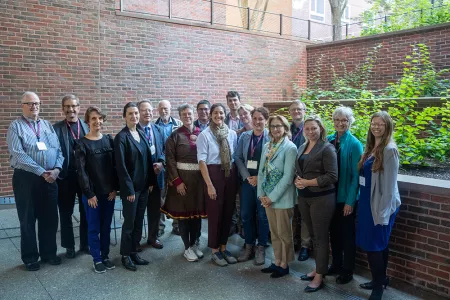In March 2022, seven of the eight Arctic states announced an unprecedented pause in the operations of the Arctic Council to protest Russia’s invasion of Ukraine. The pause came in the middle of Russia’s two-year Chairship of the Council—and during a period when the region is experiencing radical environmental and social transformation driven by climate change.
Though work on Council projects not involving Russia resumed in a limited way in June 2022, the disruption caused by the Ukraine crisis has been severe. For nearly three decades, the Arctic Council has served as the leading intergovernmental forum for circumpolar cooperation on sustainable development and environmental protection. The stoppage of Council work has cost the Arctic and the world precious time and momentum in addressing the accelerating climate crisis, pollution, biodiversity loss, food security, human health threats, and other challenges. Without Russia, circumpolar action on many of these issues is difficult.

In September 2022, the Arctic Initiative and the Wilson Center’s Polar Institute convened a small group of Arctic governance experts and practitioners to explore possible pathways for cooperation through the Arctic Council and the broader network of institutions that support the management of Arctic issues. Participants also considered how the Arctic Seven might create a path for eventual engagement with Russia—and what other systems could be substituted in some of these roles if Russia cannot be re-engaged and the Arctic Council cannot be re-established as it previously functioned.
In May 2023, after more than a year’s hiatus, Norway took over the Arctic Council Chairship from Russia, but the bulk of the Council’s work has been slow to resume. While geopolitical tensions between Russia and the Arctic Seven remain high, restoring cooperation and progress on the most pressing issues facing the region will require both urgent attention and creative solutions.
To that end, the Arctic Initiative hosted a second workshop in September 2023, with the aim of providing concrete, specific advice to the Norwegian Chairship and the U.S. State Department on strategies to proceed with working level cooperation on the high-priority issues of climate science and emergency management, preparedness and response. The workshop findings will be shared during a session at the 2023 Arctic Circle Assembly. The workshop represents the first in a series of dialogues to be co-hosted by the Arctic Initiative with the Fridtjof Nansen Institute, Norwegian Institute of International Affairs, and the Wilson Center’s Polar Institute.
“Today, ensuring a productive future for Arctic cooperation has been made much more challenging by Russia’s unconscionable invasion of Ukraine,” Initiative Co-Director John Holdren wrote in a response to Norway’s program for its Arctic Council Chairship. “What will matter in this environment is not only Norway’s priorities for its Chairship, but gaining the enthusiastic participation in those priorities of all who understand the importance of international and cross-cultural collaboration in shaping the Arctic future.”
Hanlon, Elizabeth. “Charting a Course for Working-Level Cooperation in the Arctic.” Belfer Center for Science and International Affairs, Harvard Kennedy School, September 25, 2023
